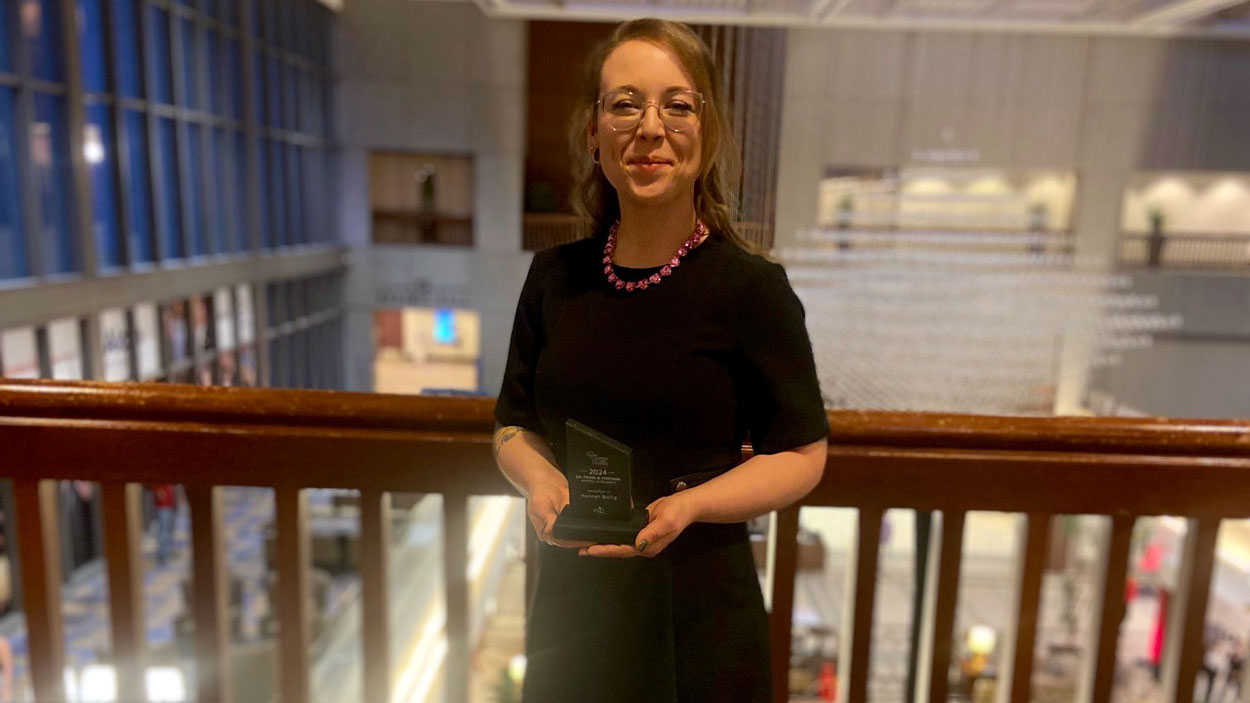
As the winner of the prestigious Dr. Frank D. Fontana Memorial Scholarship from the Heart of America Eye Care Congress, UMSL Optometry student Hannah Bollig received a $4,250 scholarship, in addition to a $750 travel grant to attend the Heart of America Eye Care Congress last month, where she was presented with the award. (Photo courtesy of Ron Kemper)
Hannah Bollig often thinks back to one of the first eye exams she administered after receiving her white coat during her second year in the College of Optometry at the University of Missouri–St. Louis.
She had traveled to Detroit with UMSL’s chapter of Student Volunteer Optometric Services to Humanity – of which she is now president – to administer free eye exams to those in need. Her patient was a quiet 6-year-old with myopia and a strong prescription that had never been corrected.
“She was super nearsighted – she couldn’t see across the room,” Bollig remembered. “She probably couldn’t see people’s faces, depending on how tall they were.”
Once the young patient had received her prescription and a new pair of glasses, she came back over to Bollig, covering her eyes. At first, Bollig was concerned something was wrong – until the girl pulled her hands down for a peekaboo-style reveal.
“She’s like, ‘Look at my new glasses!’” Bollig said. “She could finally see everything, and she was acting like a kid; she was suddenly goofy and looking all around. I realized at that stage that getting to do that changed her life. And it wasn’t a disease case, it wasn’t an amazing breakthrough in terms of figuring out a diagnosis; it was just a refraction to correct her vision, but it made that big of a difference for her. That really perpetuated everything for me where I realized if I give back, I can do this for people. And it’s awesome.”
That was just one story Bollig shared in her winning application for the prestigious Dr. Frank D. Fontana Memorial Scholarship from the Heart of America Eye Care Congress. Bollig, now in her third year in the College of Optometry, was the singular recipient of the award across the country and the first third-year student to receive it in its history. She received a $4,250 scholarship, in addition to a $750 travel grant to attend the Heart of America Eye Care Congress last month, where she was presented with the award.
Bollig was honored to have her effort and dedication to optometry recognized by other doctors in the field. As the mom of a 6-year-old and 10-year-old daughter, the award also served as confirmation that her hard work – and commitment to time management – has paid off.
“It’s a lot of spinning plates, and you have to just suck it up sometimes,” she said. “If I’m studying, I’m losing that time with my kids or my husband, or if I’m spending time with my kids, I’m losing that time to study. But I think getting the award showed my kids that if you put the effort in and you’re giving back, someone’s going to notice. It felt like a win for everybody because they realized not only am I giving back, but it did something for the family, too. It made them acknowledge that the time I spent away from them added up to a greater thing.”
Bollin, who grew up in central Illinois, worked at a tech company before starting optometry school but felt like something was missing. After shadowing a few optometrists, she was drawn to the profession’s community-minded approach – something she also observed when considering UMSL’s College of Optometry.
“UMSL just had a very family vibe,” she said. “We’re a smaller college; we only usually have about 40 students typically and everyone knows your name. You can talk to the teachers and even the administration and the dean, and everyone was just so kind and very warm. You don’t really get that everywhere, so I loved that. Everyone also seemed very community-oriented. All schools might have some way of giving back, but it seemed more important to UMSL, and I appreciate that a lot because it’s important to me, so we just aligned.”
Through her work with different student organizations in the College of Optometry, Bollig has had plenty of opportunities to give back and expand the reach of the optometry community. As a member of UMSL chapter of SVOSH, she’s traveled to Detroit as well as Miami to provide free eye exams and is currently coordinating volunteer trips for other students in her new role as president. As secretary for UMSL’s chapter of the National Optometric Student Association, she’s spoken to high school students about the profession, its range of opportunities and its impact on the community. She’s also participated in classes aimed at offering better care for patients who speak Spanish or ASL.
“Aside from making me a better doctor, you just feel good,” she said of her volunteer experiences. “Everyone’s there volunteering and just trying to lift up these communities. That’s been really amazing.”
Bollig reflected on all of these experiences in her application for the Dr. Frank D. Fontana Memorial Scholarship to show how she embodies many of the traits of the late eponymous optometrist, including empathetic patient care, adaptability to technology, clinical skills and perpetuating the OD community. In her paper, she also wrote about her interest in low vision and working with patients who have been diagnosed with progressive vision loss to maximize their usable vision and increase their independence.
“I feel like low vision is the epitome of empathetic clinical care,” she said. “We’ll have people come in who maybe have glaucoma or something along those lines, and they can’t read their book anymore. We work with them so that they can read their book again – maximizing their independence and giving them tools to still live their life as normally as possible. For me, that’s the best.”














